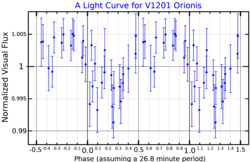 A visual band light curve for V1201 Orionis, adapted from Brinkworth et al. (2013) | |
| Observation data Epoch J2000 Equinox J2000 | |
|---|---|
| Constellation | Orion |
| Right ascension | 05 56 25.47 |
| Declination | +05° 21′ 48.6″ |
| Apparent magnitude (V) | 14.105 |
| Characteristics | |
| Spectral type | DAP8.9 |
| Apparent magnitude (B) | 14.69 |
| Apparent magnitude (V) | 14.10 |
| Apparent magnitude (R) | 14.0 |
| Apparent magnitude (I) | 13.6 |
| Apparent magnitude (J) | 12.930 ± 0.022 |
| Apparent magnitude (H) | 12.720 ± 0.025 |
| Apparent magnitude (K) | 12.653 ± 0.024 |
| Astrometry | |
| Proper motion (μ) | RA: -444.685 mas/yr Dec.: -925.140 mas/yr |
| Parallax (π) | 123.1989 ± 0.0170 mas |
| Distance | 26.474 ± 0.004 ly (8.117 ± 0.001 pc) |
| Absolute magnitude (MV) | 14.59 |
| Details | |
| Mass | 0.71 ± 0.03 M☉ |
| Radius | 0.011 R☉ |
| Surface gravity (log g) | 8.20 ± 0.05 cgs |
| Temperature | 5790 ± 110 K |
| Age | 3.97 Gyr |
| Other designations | |
| WD 0553+053, V1201 Ori, LHS 212, LTT 17891, NLTT 15834, G 099-047, GJ 1087, G 102-40, G 106-15, EGGR 290, 2MASS J05562547+0521486, USNO-B1.0 0953-00073703, Gaia DR2 3320184202856027776 | |
| Database references | |
| SIMBAD | data |
G 99-47 (V1201 Orionis) is a nearby degenerate star (white dwarf) of spectral class DAP8 (DAP8.9, or DAP8.7), the single known component of the system, located in the constellation Orion. G 99-47 is probably the tenth closest white dwarf, followed by Gliese 293, Gliese 518 and Gliese 915.
The mass of G 99-47 is 0.71±0.03 Solar masses; its surface gravity is 10 (1.58 · 10) cm·s, or approximately 162 000 of Earth's, corresponding to a radius 7711 km, or 121% of Earth's. Its temperature is 5790 ± 110 K, almost like the Sun's; its cooling age, i. e. age as degenerate star (not including lifetime as main sequence star and as giant star) is 3.97 Gyr. Due almost equal to the Sun's temperature, GJ 1087 should appear almost the same white color as the Sun. The white dwarf has a strong magnetic field, with measured vertical component near surface equal to 560 T.
See also
Notes
- From apparent magnitude and parallax.
- From surface gravity and mass.
- White dwarf cooling age, i. e. age as degenerate star (not including lifetime as main sequence star and as giant star)
References
- Brinkworth, Carolyn S.; Burleigh, Matthew R.; Lawrie, Katherine; Marsh, Thomas R.; Knigge, Christian (August 2013). "Measuring the Rotational Periods of Isolated Magnetic White Dwarfs". The Astrophysical Journal. 773 (1): 47. Bibcode:2013ApJ...773...47B. doi:10.1088/0004-637X/773/1/47. hdl:2381/37593. S2CID 56285149.
- ^ "V* V1201 Ori -- White Dwarf". Centre de Données astronomiques de Strasbourg. Retrieved 2011-11-01.
- ^ Holberg, J. B.; Sion; Oswalt; McCook; Foran; Subasavage (2008). "A New Look at the Local White Dwarf Population". The Astronomical Journal. 135 (4): 1225–1238. Bibcode:2008AJ....135.1225H. doi:10.1088/0004-6256/135/4/1225. S2CID 122855486.
- ^ Sion, Edward M.; Holberg; Oswalt; McCook; Wasatonic (2009). "The White Dwarfs within 20 Parsecs of the Sun: Kinematics and Statistics". The Astronomical Journal. 138 (6): 1681–1689. arXiv:0910.1288. Bibcode:2009AJ....138.1681S. doi:10.1088/0004-6256/138/6/1681. S2CID 119284418.
- ^ Brown, A. G. A.; et al. (Gaia collaboration) (2021). "Gaia Early Data Release 3: Summary of the contents and survey properties". Astronomy & Astrophysics. 649: A1. arXiv:2012.01533. Bibcode:2021A&A...649A...1G. doi:10.1051/0004-6361/202039657. S2CID 227254300. (Erratum: doi:10.1051/0004-6361/202039657e). Gaia EDR3 record for this source at VizieR.
- ^ Yale Trigonometric Parallaxes, Fourth Edition (van Altena+ 1995)
- Bagnulo, Stefano; Landstreet, John D. (2020), "Discovery of six new strongly magnetic white dwarfs in the 20 pc local population", Astronomy & Astrophysics, 643: A134, arXiv:2010.05795, Bibcode:2020A&A...643A.134B, doi:10.1051/0004-6361/202038565, S2CID 222290583
| Constellation of Orion | |||||||||||||
|---|---|---|---|---|---|---|---|---|---|---|---|---|---|
| Stars |
| ||||||||||||
| |||||||||||||
| Star clusters |
| ||||||||||||
| Nebulae |
| ||||||||||||
| Galaxies |
| ||||||||||||
| |||||||||||||
This article is a stub. You can help Misplaced Pages by expanding it. |